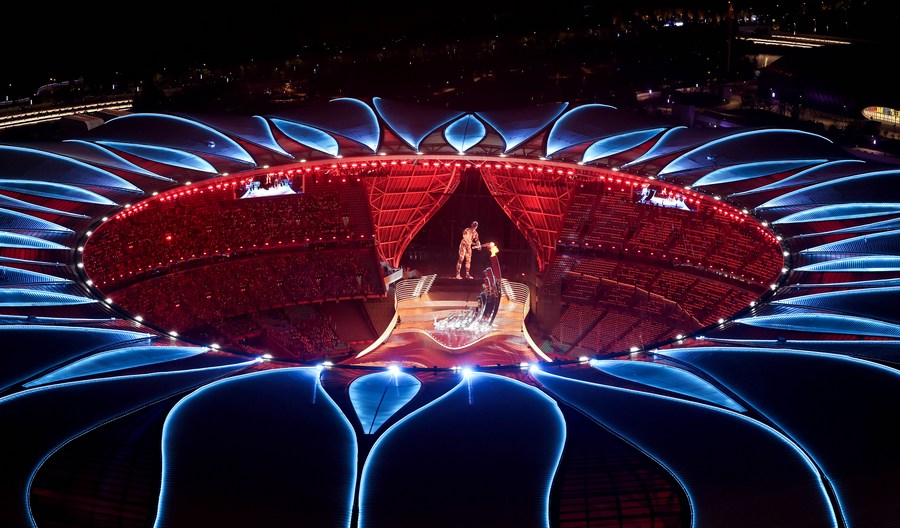China kicks off the Asian Games with no fireworks and a parade of global leaders
Asia’s version of the Olympics kicked off with dazzling light shows, an esports debut, and a slew of top dignitaries in attendance. Xi courted top Syrian and South Korean officials amid the fanfare, but his government also raised fresh tensions in its border dispute with India.

Chinese leader Xí Jìnpíng 习近平 opened the Asian Games in the eastern Chinese city of Hangzhou on September 23, after a one-year delay due to Beijing’s now-axed COVID-zero curbs.
The 2023 Asian Games is China’s biggest sporting event in more than a decade by several metrics: About 12,000 athletes from 45 nations are set to compete in 40 sports, and it will be held in 56 venues — 12 of which have been newly built.
The spectacular opening ceremony, hosted in the city’s 80,000-capacity Olympic Sports Center Stadium, dazzled crowds with futuristic light shows, 3D animations, and a virtual torchbearer. No real fireworks were set off, in an apparent effort to showcase China’s commitment to green development and to cement Hangzhou’s status as a tech and ecommerce hub. The ceremony was a stark contrast to the muted fanfare of the masked and tightly controlled Beijing Winter Olympics in February 2022, when the country was still locked down under strict pandemic restrictions.
Visiting dignitaries included International Olympic Committee President Thomas Bach and Syrian President Bashar al-Assad, who is on his first visit to China since the civil war erupted in Syria in 2011. Cambodian King Norodom Sihamoni and leaders from Kuwait and Nepal were also among those who attended, Chinese state television CCTV reported.
The Games will run until October 8. They are held once every four years, effectively making them a regional Olympics.
Esports makes its long-anticipated debut
This year’s Asian Games are the first time esports will be treated as an official medal event, a highly anticipated debut for the country’s more than 400 million esports fans. Hundreds of pro players have descended on Hangzhou to represent their countries, with gold medals in play across seven top titles such as League of Legends and Arena of Valor.

At least 5 million people applied for esports tickets priced between 200 and 1,000 yuan ($27–$137) — more than popular sports such as table tennis, diving, and swimming, according to some estimates by the Games’ Organizing Committee.
It’s a lucrative industry: Chinese tech giant Tencent reported in July that spending on esports has increased, with 29% of gamers spending between 500 and 2,000 yuan in the year up to May 31, 2023, compared with 24% a year earlier. The company has also helped set up esports hotels in anticipation of the event, where fans get close to the action while also playing their favorite games on cushy seats and top-of-the-line hardware.
But the excitement over the landmark inclusion of esports comes as the Chinese government has cracked down on its gaming industry in recent years. China unexpectedly dropped the live broadcast of some esports matchups at the games, causing confusion among some esports fans.
Xi hints at a visit to South Korea
Xi met with South Korean Prime Minister Han Duck-soo right before the games began. Xi called for “steady and solid advancement” of bilateral ties, while urging their two countries to “meet each other halfway” and shore up supply chains.
Xi, who has not visited South Korea since 2014, also reportedly said he is “seriously considering” paying a visit to Seoul, though did not specify any further details. It is unlikely that a visit will occur as soon as this year, but a visit in 2024 would be “a turning point in Korea-China relations,” South Korea’s national security adviser Cho Tae-yong said in an interview with MBN cable TV yesterday.
India protests the exclusion of three of its athletes
The day before the games began, India lodged a protest with China after three of its athletes were unable to download the necessary travel documents from an official Chinese website to enter the country, forcing them to withdraw while the rest of their 10-member team went ahead to attend the games.
The three female martial artists are from the disputed Himalayan region of Arunachal Pradesh, which India says falls under its jurisdiction but is also claimed almost in full by Beijing as “South Tibet.”
Upon learning of their apparent exclusion, Indian Sports Minister Anurag Thakur canceled his plan to visit China. “Chinese authorities have, in a targeted and premeditated manner, discriminated against some of the Indian sportspersons from the state of Arunachal Pradesh by denying them accreditation and entry to the 19th Asian Games,” India’s Ministry of External Affairs representative Arindam Bagchi said in a statement.
When asked about the visa issues that forced the trio to withdraw, Chinese Foreign Ministry spokesperson Máo Níng 毛宁 said: “As the host country, China welcomes athletes from all countries to the Games using legal identification. The Chinese government has never recognized so-called ‘Arunachal.’”
“The area of Zangnan is Chinese territory,” she added, using the Chinese name for the region.






